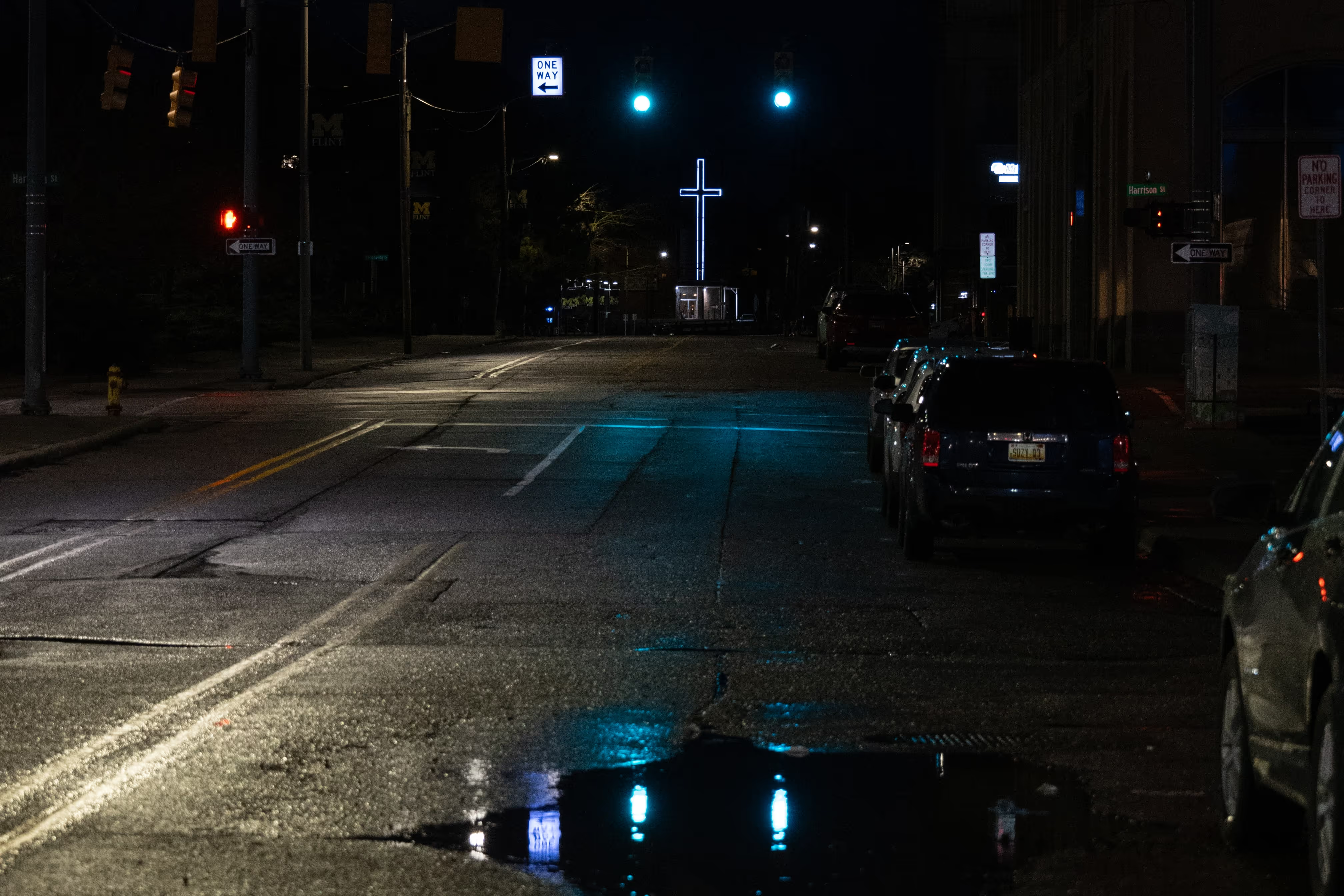
FLINT — On a Sunday morning in early March, Pastor DeVontae Powell pulled on his black robe and walked down the aisle of Vermont Christian Church to the sounds of piano keys and drums to tell his community an affirmation he believes above all else: “Don’t give up the fight for your life.”
As light filtered through stained glass windows and hums reverberated in a choir of sound, a sense of serenity settled over a room of around 30 people who have stood by each other through decades of hardship.
Flint, a city that for more than 40 years was the nation’s epicenter of automotive success, has wrestled with the effects of disinvestment since auto giant General Motors started to pull out in 1999 and left 70,000 people without jobs by 2006. Once a dream destination for middle class workers migrating from the South, the city fell into an economic collapse that led to state-appointed emergency managers taking over and switching the water source in 2014 to save money, setting off the country’s largest environmental health disaster.
But Flint’s story of resilience began decades before the water crisis placed the predominantly Black city in national headlines. Long before lead and other contaminants ran through its pipes and poisoned its people, Flintstones, as they call themselves, learned how to lean on each other for support and find outlets to trust outside the institutions that failed them.
“It’s hard for us to see the humanity of a leader that we have given divinity to,” Powell told the congregation during his sermon. “In other words, when we put men and women higher than they ought to be, when they fall, it hurts us.”
Powell, 30, is the youngest pastor in the history of the church. During the height of the water crisis, he was studying special education an hour away at Eastern Michigan University. Visiting home and seeing his community struggle inspired him to become a pastor and preach liturgy that speaks truth to power, he said.

“If we’re going to care for people, if we’re going to create a space where people can heal from generations of trauma and generations of suppressed stories, we have to be honest.”
Congregants say the wood-paneled walls of the church seem to circumvent outside stressors, political differences and challenges they have become accustomed to. The trust these Flint residents lost in city officials and institutions has been placed three-fold in God, an entity they know won’t let them down.
“If you ever want to lose the people of every city, break their trust, and you’ll start to see a difference,” said Micheal Claytor, 55, a few days after the church service he attended with his wife, Charonda.
The couple met while working at General Motors in 2005. The factory closure forced them to move to Illinois for eight years, but they frequently returned home to visit their families and saw firsthand the fight their loved ones fought to be heard by political leaders. They moved back to the city in 2020.
“I don’t think a lot of people understand it,” Claytor said. He and Charonda have been members of Vermont Christian Church for more than a decade. “Flint is an example of what happens when officials only think about themselves and no one else.”
‘Trust is quite complicated’
When minority communities are imposed upon by outside political leadership, they often create a “civil society,” a term political scientists use to describe the formation of nonprofits and citizen-led groups seeking change, said Ben Pauli, associate professor of social science at Kettering University in Flint.
Pauli has looked at how to combine teaching and activism since he moved his family to the city in 2015. He wrote a book in 2019 entitled “Flint Fights Back” and serves on the board of the Environmental Transformation Movement, a Flint-based nonprofit.
In 2012, the Michigan Legislature passed the "Local Financial Stability and Choice Act," which gave the governor authority to appoint an emergency manager to take legal control of any “financially distressed” Michigan municipality. A version of the emergency manager law has existed since 2000, but when former Gov. Rick Snyder took office in 2011, lawmakers expanded the language to give emergency managers increased power over the municipalities they serve.
Despite voters across the state rejecting the measure in a 2012 referendum, the bill passed a month later with an appropriation that made it immune from future referendums. More than 50% of Michigan’s Black residents have been placed under emergency manager rule, compared to only 2% of the state’s white population.
Over the span of three and a half years, Flint had four unelected officials take control of city affairs, one of whom — Darnell Early — made the decision to change the city’s water source from Lake Huron in Detroit, an hour away, to the nearby and polluted Flint River.
When Early resigned in January 2015, he was replaced by another emergency manager, Gerald Ambrose, who rejected an offer from the Detroit Water and Sewerage Department to switch back to their water at a lower rate, even after residents had begun reporting discolored and foul-smelling water.
“When the key decisions about Flint’s water were made, they weren’t being made by elected representatives, they were being made by unelected emergency managers who were not supposed to be responsive to and accountable to residents,” Pauli said. “Residents were basically sitting on the sidelines as some really fateful choices were made about where the water was going to be sourced from.”
Though Michigan has not put an emergency manager in control of Flint since 2015, the law remains on the books. Efforts to repeal or revise the law in recent years have stalled. Only 20 states including New Jersey and Rhode Island have a version of an emergency manager law in place, but Michigan’s iteration gives the appointed manager the greatest amount of oversight. It also coincides with research findings that state takeovers historically target majority-Black towns.
Cary Wu, a political sociologist at York University in Canada, researches what the erosion of trust in political institutions can mean for communities in positions of less power.
Flint’s history, coupled with experiences residents are feeling today, has likely led to a “highly uncertain environment where people rely on each other to make changes,” he said.
Studies have shown that the share of white Americans who show high levels of personal trust is twice as high as the share of Black Americans, which Wu said stems from the generations of distrust Black Americans have felt because of governmental policies.
When Flint residents learned that government officials ignored warnings and downplayed risks, prioritizing cost-cutting over public safety, the abuse of power led to a lower threshold of trust that will be difficult to regain.
“Political trust is quite complicated,” he said. “When people feel vulnerable, they need trust more.”
‘A part of the city that I loved collapsed’
On May 4, 2016, former President Barack Obama appeared on television screens across the nation as he lifted a glass of water and took a sip, announcing to a crowd of reporters that Flint water was safe to drink.
The press conference took place in the auditorium of Northwestern High School, a public school in north Flint, the city’s poorest neighborhood. The school closed its doors in 2020 due to skyrocketing utility costs and necessary repairs the city couldn’t afford to make.
As Patrick McNeal watched the president address the nation in the auditorium of his alma mater, he couldn’t help but feel betrayed. The press conference effectively ended the water crisis for many viewers across the country, but the issues were far from over for those who lived within city lines.
“I just want to know where he got that glass from,” McNeal said with a chuckle as he unwrapped the McDonald’s hash browns he was having for breakfast on a Thursday morning in his office housed inside a former elementary school in north Flint.
If Obama had bothered to walk through the halls of his high school that day, McNeal said he would have seen all the water fountains covered in plastic.
For the past decade, McNeal, 57, has served as director of the North Flint Neighborhood Action Council, a group that brings together residents to raise engagement. The council holds community workshops and leads with the slogan “Nothing about us without us.”
McNeal believes that for those who were born and raised in Flint, the concept of trust in institutions has been absent ever since General Motors shrunk and the state and federal funds the city received in the aftermath of the water crisis never seemed to make it beyond developing a modern downtown.
“Our distrust didn't start with the water crisis. The water crisis actually exacerbated a problem that was already happening and this is a problem with leadership in general,” he said. “The seeds of distrust were sown prior to the water crisis and then by the time the water crisis came they just were grown. I just know that a part of the city that I love collapsed.”
A smile grew across his face as a volunteer knocked on his office door to begin helping with set up for a community workshop event the next day. This is the outlet that keeps him and his family of nine going.
“I handle my community with care because too many people don't care about them,” he said. “They understand that we have to handle each other with care because if we destroy each other, nobody else is coming.”
‘People wear multiple hats because they have to’
In March 2024, Mona Munroe-Younis listened in on a meeting between Flint city staff and Environmental Protection Agency Regional Administrator Debra Shore. During a lull in the conversation, she remembers Shore asking the question, “Are people in Flint starting to trust City Hall again?”
“It’s self preservation not to just blindly trust again,” said Munroe-Younis, who is the executive director of the Environmental Transformation Movement and is on the state’s advisory committee for environmental justice. “We would be stupid to go back to what it was like before and just blindly trust that things are going to work out for the public good.”

Munroe-Younis bustles around the city every day helping out a number of organizations while also raising her energetic 9-year-old son, whom she was pregnant with during the water crisis.
When her son was born, he quickly developed severe skin rashes that left her petrified that something would be permanently wrong. The lack of support she felt then from local institutions remains strong today, a decade later, as she also grapples with the chronic effects of psoriasis on her own skin.
“How do you trust the systems that weren’t honest, that weren’t there for you, that didn’t listen in a time of crisis?” she asked.
Munroe-Younis said she felt drawn to create an on-the-ground environmental justice organization to ensure that a public health calamity of this measure never happens again to the people of Flint, or to people anywhere.
“In predominantly Black and brown communities, you have to advocate for yourself because the resources aren’t always there,” she said. “In communities like Flint, it seems like every facet of life becomes a need for advocacy.”
But despite her and her colleagues’ efforts to raise awareness, the state pulled most water-related resources out of Flint in 2018, such as readily available water testing kits and NSF-certified water filters for lead removal. The media, too, withdrew its attention, she said.
“My heart is kind of breaking because a lot of us in Flint really channeled our pain and anger from living through the water crisis to try to make policies change to make it better for everybody else,” she said. “Most people just want to feel whole again, but I don’t think any of us will trust the government the same.”
‘We keep each other safe’
Although many in the city are still battling challenges that sprung from the water crisis, one thing is certain: The people of Flint don’t want to be defined by what happened to them.
On Monday nights, residents show up for live music at Churchill’s Food and Spirits. On Tuesdays, the same crowd ventures further downtown to Soggy Bottom Bar for jazz night. On Thursday, Saturday and Tuesday, the Flint Farmers’ Market fills up with people looking for their favorite vendor of food, drink or art.
Ashton Young likens his bluegrass band’s performances at Churchill’s Food and Spirits to a “Monday night church service.”
Between bites of the restaurant’s bread pudding, his bandmate, Vaughan Mortimer, agreed. Some of their friends who call Churchill’s “Church” will often say, “You have Church tonight? All right, I’ll see you there,” he said.
Under dim blue and purple lighting, heads bump and feet stomp to The Outfit’s musical creations. Beside the makeshift stage hangs a sign that reads “Wanted: Honest Attorney.” The band has been playing there nearly every Monday night since 2017.
“You kind of turn to your people when you can’t trust anybody else,” said Kaden Powers, 24, who is on guitar and vocals.

The amount of trust Flint residents have in each other is what drove Julian Pacella to move into the city from nearby Grand Blanc, Michigan.
He began working a booth at the Flint Farmers’ Market for Cinnamom Bakery almost four years ago, and said he was shocked by the openness and community he discovered after only hearing negative things about Flint back in his hometown.
“People here have each others’ backs regardless of who you are,” he said. “There’s a lot of that common decency that we seem to be lacking in a lot of other areas in this country and that’s really what drew me to this place.”

Flint is no stranger to challenges, and through every one, trust in one another has appeared to grow.
“Flint’s been through a lot. They kind of had to come together and really figure out, ‘how do we make this work, how do we keep each other safe and keep each other fed?’” Pacella said. “It really just comes down to, ‘Hey, these are people who have overcome adversity by sticking together.’ That’s the kind of place I want to be.”
